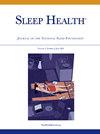Parental knowledge and beliefs about sleep health for children with overweight and obesity
IF 3.4
2区 医学
Q2 CLINICAL NEUROLOGY
引用次数: 0
Abstract
Objective
To examine parental knowledge and beliefs about sleep health and their relation to sleep practices in a community sample of school-age children with overweight and obesity.
Methods
Sleep in 246 overweight or obese children was assessed objectively using actigraphy. Parents completed a questionnaire about their knowledge and beliefs about sleep health and the Children’s Sleep Habits Questionnaire (CSHQ). Multivariate linear regression models were performed to predict CSHQ sleep disturbance scores and actigraphy-derived sleep characteristics in children.
Results
On average, parents answered 6.19 of the 10 sleep health questions correctly. Questions concerning child sleep needs and bedtime routines had the most incorrect responses ranging from 45.9% to 84.5%. Although up to 244 (99.2%) children obtained less than the recommended 9 hours of daily sleep and 208 (84.6%) children had clinically significant CSHQ sleep disturbance scores, only 12.6% of parents believed that their child slept too little and only 9.3% of parents believed that their child had inadequate sleep habits. Increased levels of parental sleep knowledge were associated with earlier sleep onset, and stronger parental beliefs about children’s sleep health predicted earlier sleep onset and offset, longer sleep duration, and lower CSHQ sleep disturbance scores in children (all p < .05).
Conclusions
Parents’ knowledge gaps and misconceptions about sleep health are associated with poorer and shorter sleep duration in children with overweight and obesity. Healthcare professionals should provide parents with sleep-related education and address parents’ inaccurate beliefs about sleep health, particularly regarding consistent bedtime routine and recommended sleep duration for children.
父母关于超重和肥胖儿童睡眠健康的知识和信念。
目的:了解社区超重和肥胖学龄儿童中父母关于睡眠健康的知识和信念及其与睡眠习惯的关系。方法:采用活动描记仪对246例超重或肥胖儿童的睡眠进行客观评价。家长完成了一份关于睡眠健康知识和信念的调查问卷和儿童睡眠习惯问卷(CSHQ)。采用多元线性回归模型预测儿童CSHQ睡眠障碍评分和活动描记法得出的睡眠特征。结果:10个睡眠健康问题中,家长平均答对6.19个。关于儿童睡眠需求和就寝时间的问题回答错误最多,从45.9%到84.5%不等。尽管高达244名(99.2%)儿童的每日睡眠时间少于建议的9小时,208名(84.6%)儿童的CSHQ睡眠障碍评分具有临床显著性,但只有12.6%的家长认为他们的孩子睡得太少,只有9.3%的家长认为他们的孩子睡眠习惯不足。父母睡眠知识水平的提高与较早的睡眠开始相关,父母对儿童睡眠健康的信念越强,儿童的睡眠开始和偏移时间越早,睡眠持续时间越长,CSHQ睡眠障碍评分越低。结论:父母对睡眠健康的知识差距和误解与超重和肥胖儿童的睡眠持续时间较差和较短有关。医疗保健专业人员应该为父母提供与睡眠有关的教育,并纠正父母对睡眠健康的不准确观念,特别是关于儿童一致的就寝时间和建议的睡眠时间。
本文章由计算机程序翻译,如有差异,请以英文原文为准。
求助全文
约1分钟内获得全文
求助全文
来源期刊

Sleep Health
CLINICAL NEUROLOGY-
CiteScore
6.30
自引率
9.80%
发文量
114
审稿时长
54 days
期刊介绍:
Sleep Health Journal of the National Sleep Foundation is a multidisciplinary journal that explores sleep''s role in population health and elucidates the social science perspective on sleep and health. Aligned with the National Sleep Foundation''s global authoritative, evidence-based voice for sleep health, the journal serves as the foremost publication for manuscripts that advance the sleep health of all members of society.The scope of the journal extends across diverse sleep-related fields, including anthropology, education, health services research, human development, international health, law, mental health, nursing, nutrition, psychology, public health, public policy, fatigue management, transportation, social work, and sociology. The journal welcomes original research articles, review articles, brief reports, special articles, letters to the editor, editorials, and commentaries.
 求助内容:
求助内容: 应助结果提醒方式:
应助结果提醒方式:


